|
Ford's
research in health disparities improves outcomes
By
Cindy
Abole
Public Relations
In her 20 years working in
population research and academia, MUSC behavioral scientist and
cancer epidemiologist Marvella Ford is living her dream and making
a difference in the lives of others.
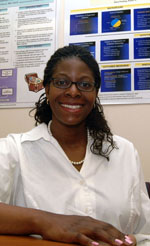 Dr. Marvella
Ford Dr. Marvella
Ford
Ford, Ph.D., has
accomplished this as a dedicated researcher and mentor to others while
meeting her own interests of improving the environment around her by
helping others succeed. She's a living example of what spiritual and
political leader Mahatma Gandhi meant challenging individuals to "be
the change you want to see in the world."
Ford came to MUSC in
2005 as an associate professor in the Division of Biostatistics and
Epidemiology and in 2006, accepted dual roles at the Hollings Cancer
Center (HCC) as co-director for Cancer Prevention and Control Program
and associate director for cancer disparities.
"We've made a lot of
progress, but we have a long way to go as it relates to understanding
the causes of disparities within communities. They can be caused by
many things from social and environmental causes to behavioral and
genetic contributors.
We're just starting to
understand this," said Ford.
Ford is one of four women
in March being recognized as part of the MUSC's National Women's
History Month program celebrating leadership and excellence. "Our
History is Our Strength" is the 2011 theme recognizing 100 years
of women's achievements around the world.
Ford has dedicated her
career to identifying and eliminating health disparities among
populations and in communities. She's conducted studies that focus on
factors affecting the participation of older African-Americans in
cancer clinical trials research.
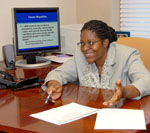 Dr. Marvella
Ford explains her research. Dr. Marvella
Ford explains her research.
In spring 2009, HCC
won National Cancer Institute designation becoming the only cancer
center in the state to achieve this status as it joined the ranks of
elite cancer centers across the country. This designation raises the
bar for the institution to find more effective approaches to cancer
prevention, diagnosis and therapy. Ford has contributed her expertise
in several patient outreach, education and prevention programs through
the HCC's Cancer Prevention, Control and Outreach Program.
She's gained some support
through multi-site South Carolina Legacy Grants to increase breast and
cervical cancer screenings among at-risk black populations around South
Carolina and evaluating the outcomes.
"Our goal is to reach
women who've never been screened for mammograms and other cancer tests.
These evidence-based interventions are demonstrating how we can make an
impact on cancer death rates in statewide communities," Ford said.
Past
Defines
Future
Ford grew up as the only daughter of hard-working, middle-class parents
in Plattsburgh, New York located on Lake Champlain. She excelled in
school and was the only one of her siblings to choose a career in
academia and health sciences research.
Although she never knew
her grandparents, she remembers being affected by their absence.
According to Ford, both sets of grandparents died when her parents were
still very young. Ford seemed more interested whenever she observed how
friends interacted with their own grandparents and elderly relatives.
"I was curious and wanted
to learn more about my own grandparents and what caused their deaths.
That interest led me to studying health disparities and what were the
causes and contributions for premature death in people," she said. Both
sets of grandparents died from health-related complications.
Craving change, Ford
attended Cornell University. Her biggest influence was social
work/sociology educator and mentor Josephine Allen, Ph.D., a Fulbright
scholar and professor who gained distinction as Cornell's first black
woman to gain tenure.Allen inspired Ford and other minority students to
think critically while focusing on some of the day's top social welfare
policies and public health issues. Allen's guidance led her to further
studies in health and cancer population research.
Following in the steps of
her mentor, Ford attended the University of Michigan and completed a
dual doctoral degree program, earning master's degrees in social work
and social psychology in 1987 and 1989, respectively, and a combined
doctoral degree in 1992. She continued as a postdoctoral fellow working
on studies affiliated with the National Institutes of Health (NIH) and
National Institute on Aging. Later, Ford led an NIH-funded prostate,
lung, colorectal and ovarian cancer screening trial and collaborated
with national experts, including Barbara Tilley, Ph.D., former
Biostatistics and Epidemiology chair, in several companion studies and
grants supported by the National Cancer Institute (NCI) and the
Department of Defense (DoD) to explore recruitment strategies and
improve participation of African-American males in related trials.
A
Role Model
In 2002, Ford moved to Houston to work in the Baylor College of
Medicine and the Michael E. DeBakey VA Medical Center, where she
conducted an NIH/NCI-funded R01 study examining ways to improve the
informed consent process. Later, she had a chance to mentor other
minority developing faculty in disparities research working with the
state's Historically Black Colleges and Universities (HBCU)
specifically at Texas Southern University's College of Pharmacy.
"Every time we conduct a
research study, it naturally leads to asking more questions and seeking
answers, which is the exciting part," she said. Ford's success in Texas
helped her build a foundation for mentorship and development
of MUSC junior faculty and cancer research-minded undergraduate
students who were interested in population-based health disparity
research at other HBCUs—South Carolina State
University, Claflin University, Vorhees College and other
statewide institutions.
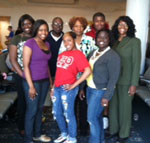 Just recently, Ford
accompanied six program students whose research abstracts were selected
for presentation at the DoD Prostate Cancer Research Program's
Innovative Minds in Prostate Cancer Today conference in Orlando, March
9-12. Ford and several project colleagues also presented abstracts
describing the training program. Just recently, Ford
accompanied six program students whose research abstracts were selected
for presentation at the DoD Prostate Cancer Research Program's
Innovative Minds in Prostate Cancer Today conference in Orlando, March
9-12. Ford and several project colleagues also presented abstracts
describing the training program.
MUSC's Dr. Marvella
Ford and Melanie Johnson accompanied
students who presented research abstracts relating
to prostate cancer at a March conference in Orlando.
Sabra Slaughter,
Ph.D., chief of staff, MUSC President's Office, is a co-principal
investigator (along with Ford) on the three-year Southeastern Virtual
Institute for Health Equity and Wellness (SE VIEW) project. SE VIEW
focuses on reducing health disparities through research and outreach in
the areas of health education, screening and follow-up for communities
around the I-95 corridor of South Carolina.
"Marvella is a smart,
attentive and gracious person and an exceptional colleague and
recognized standard-bearer for excellence as it relates to
community-based research," he said.
Ford continues to make her
own mark at MUSC and the lives of many South Carolinians and
minorities across the country. "Throughout my life, I've always wanted
to help people. I feel I'm able to do this by organizing quality,
designed research studies that may ultimately make a difference in the
health and wellness of others."
King lends style, experience to role in public
relations
By Dawn Brazell
Public Relations
Whether it's dancing with
President Ronald Reagan or in the hot seat with Larry King, Sarah King
exudes grace under pressure.
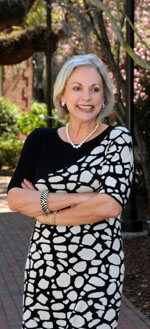 Dr. Sarah King Dr. Sarah King
It's a gift that has
served her well through the years, particularly as MUSC's director of
the Office of Public Relations. King, DHA, is one of four women
selected at MUSC to be honored as part of National Women's History
Month as women who exemplify leadership qualities and who make
significant contributions in their fields.
Becoming a strong leader
really wasn't an option for King, whose father's diplomatic and
military career had her in training at an early age. Born in Fort
Riley, Kansas, she lived in six states before she was 8. Then it was
off to Europe, where she attended a boarding school in Switzerland,
getting a crash course in French and German so she'd be able to make
friends. She remembers it as a lonely, but exciting time and one of
many lessons she'd have in life on the value of adaptability.
It was a lesson her mother
taught her as well.
Her mother, who's from
Poland, survived the invasion of the Russians at age 12 and lived in
the woods with resistance forces for two years. "Then the Nazis came
into Poland, and she never saw her family again after that."
King said her mother
taught her and her sister to be strong and independent. They could move
from continent to continent, and within a week she'd have them all
resettled. Her mother, a fabulous hostess, speaks five languages.
"She's one of the most
brilliant people I've ever met and she's always happy, which is strange
given all that she went through as a child. She's elegant—just very
elegant."
King returned to the
States with her family at age 13, eventually settling in Atlanta, Ga.,
where her father retired to do management consulting.
"He had this great idea
about servant leadership long before anyone else was talking about it.
I got to go to a lot of the lectures. It's funny how life comes full
circle because 40 years later my doctorate was in leadership. So much
of what was taught was stuff that would echo from Daddy years and years
ago."
Up
in the Air
King, who would go on to get her doctorate in healthcare administration
and policy from MUSC in 2007, thought medicine might be her chosen
field when she first started her college studies. She attended one of
her pre-medicine classes where they watched a baby being born on film.
She laughs. "I walked out of the classroom and passed out and decided
I'd better change my major."
Graduating from the
University of Georgia with degrees in clothing and textiles and
interior design, her path took another turn. On a whim, she and a
friend saw an advertisement about TWA hiring hostesses. It was back
when such jobs were glamorous and the competition tough, with only one
in 5,000 women interviewed being hired.
"Just on a lark, we
decided to go try for it. That's back when they had weight
requirements, and you had to wear fake eyelashes. You had to wear a
girdle so you wouldn't shake when you walked down the aisle. If you had
chipped nail polish or a run in your hose, you could be fired on the
spot. It was a whole different world back then."
King's mother was
appalled. In her first act of rebellion, King decided to try it for six
months anyway.
"When I first started
flying for the airlines, my mother cried copiously. 'I can't believe
Swiss finishing schools and
colleges so you can be a
cocktail waitress in the sky.'"
King rose in management, and eventually ended up working for Eastern
Airlines where she became involved with public relations and the
marketing of new destinations. "When Eastern went out of business, my
mother was crying again. It's the second time she's cried, 'How can you
do this to us?' They got so used to the passes. I could never please
her," she said, laughing.
In the early '80s, King
worked as a news producer for the BBC and Professional Video Services
in Washington, D.C. and learned about journalism and broadcast. At
about the same time she met who was to become one of the most
influential role models in her life, activist Gloria Steinem, who
taught her the fine art of handling media.
She perfected skills she
would come to need as she became one of the founders of Mothers
Alliance for the Rights of Children (MARC), an advocacy organization
that fights for legislation to protect abused children. King was drawn
to the cause by the case of a friend. The more she learned about the
extent of the problem and ignorance in the nation, the madder she got.
"We go and fight wars for
democracy because we're so great, but yet we allow children to be
sexually abused or starved, and we send them right back to abusive
situations. It made me sick. It just made me sick."
King, a self-described
zealot in this area, poured her energy into advocacy work, pushing for
legislative advances to provide for more protection, appearing on such
television shows as "60 Minutes" and "Larry King Live" to raise
awareness, and working with Lynda Carter of Wonder Woman fame as the
cause's spokesperson.
Still active in supporting
MARC, King has received high praise for her work. Steinem, who publicly
named King as one of her three heroes, once praised her friend's
advocacy efforts saying that no one has done more to save the lives and
hearts of others.
MUSC President Ray
Greenberg, M.D., Ph.D., said one feature he admires about King is how
she approaches all
aspects of her life—at
work, at home, and in the community—with great passion and commitment.
"Her active pursuit of community service gives her exposure to issues
and concerns beyond the walls of the campus and helps to inform us
about how we can more effectively communicate about the medical
university. She networks well with the local media and is seen by
them as an honest broker of information."
Queen
of
Style
King's wardrobe reflects her belief in wearing classics. Selected by
Glamour Magazine in college as one of four best dressed coeds in
America, King has moved through the decades without losing her sense of
style.
"What I appreciate most is
individual style—whether it's home or clothing. I like people who know
themselves well enough to work and live doing what they are comfortable
with. If no one likes it, I don't care —as long as I am feeling OK with
it."
Keeping a gratitude
journal, King said she feels blessed to have had so many opportunities
in life. Having done everything from dancing with former President
Ronald Reagan at the White House to flying Cessna planes, she's content
with the places she's been and the things she's been able to do. Her
proudest accomplishment is her three children. Her soft spot is
animals. She owns two parrots and four dogs.
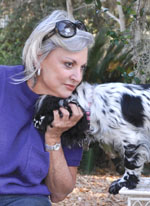 Dr. King with
her dog, Molly Dr. King with
her dog, Molly
She smiles. "My kids think
my hobby is rescuing dogs."
Of all the jobs she's
done, one of her favorite roles remains being the owner and manager of
Interiors by Design in Summerville, a job she held in the mid '80s. One
of her most fulfilling, though, has been her current one as public
relations director.
King said she never had
thought about working at MUSC, but when she became the first woman
candidate for Congress in the history of the state in 1994, it brought
her to the attention of former MUSC President James B. Edwards, DMD.
"When it was over, [Mark] Sandford won, but Dr. Edwards called me and
said, 'I'd like to talk to you about working in P.R. I didn't vote for
you, but I liked the way you ran your campaign.'"
Involved in her advocacy
work, King wasn't looking for a full-time job. What changed her mind
was the challenge Edwards set before her.
"I liked him very much and
he said, 'We're seen as a bunch of brick buildings, and I'd like for
people to have a friendly feeling toward MUSC, and your campaign felt
friendly."
When she first started
here, she told Edwards what really would help was for everyone to have
flight attendant training. She laughs. "Of course, he thought I was
insane," she said, adding that she got her point across that MUSC
needed to set the bar higher for the quality of service expected.
"How you treat people is
the most important part of life—people and animals. It says everything
about who you are. It's not what you're wearing or what you look like
or what your title is. How you open up in your heart and care about
someone else is how you are judged."
King said she loves her
job. She especially enjoyed her role in facilitating MUSC's outreach
efforts in helping Poland launch a breast cancer awareness program.
Globally and locally, MUSC does so much, she said.
"It's been better than I
expected and easier. MUSC has so many great stories. The hard part is
getting them all out. What I love most about our department is that we
affect hundreds of thousands of people by getting out the news of how
their quantity and quality of life can be improved. That's a gift to be
able to do that."
King said she feels
fortunate to have had great mentors in her life. She once tried to
thank her friend Steinem for all that she had taught her, but she
stopped her.
"'If you want to thank me,
just pass it on.' I have found that to be true because there are always
opportunities to pass it on, and it can be so rewarding in how it can
come back. Everything you say—everything you do—has a ripple effect on
the world."
Women's History Month
"Our History is our Strength"
A panel discussion will be held from noon to 1 p.m., March 31, Room
100, Basic Science Building
Romina McCandless has
worked with the Latino community in Charleston as a medical assistant,
an emergency medical technician and as a medical interpreter. She began
working with the MUSC College of Nursing’s Hispanic Health Initiative
in 2009 as a graduate intern.
Dale Rosengarten is
curator of the Jewish Heritage Collection at the College of Charleston
where she also teaches in the Jewish Studies Program.
Teresa Gore is a member of
the Santee American Indian Tribe of the areas surrounding Holly Hill.
She is the founder and director of an organization whose mission is to
honor the historical and contemporary contributions of American Indians
in S.C.
Joyce Coakley is a
Charleston native, skilled sweetgrass basket maker, historian, and
fluent speaker of the Gullah language. She is president co-founder of
the Sweetgrass Cultural Arts Preservation and owner-designer of
Sweetgrass Baskets by Design.
|





 Just recently, Ford
accompanied six program students whose research abstracts were selected
for presentation at the DoD Prostate Cancer Research Program's
Innovative Minds in Prostate Cancer Today conference in Orlando, March
9-12. Ford and several project colleagues also presented abstracts
describing the training program.
Just recently, Ford
accompanied six program students whose research abstracts were selected
for presentation at the DoD Prostate Cancer Research Program's
Innovative Minds in Prostate Cancer Today conference in Orlando, March
9-12. Ford and several project colleagues also presented abstracts
describing the training program. 
